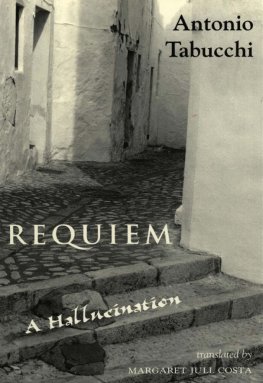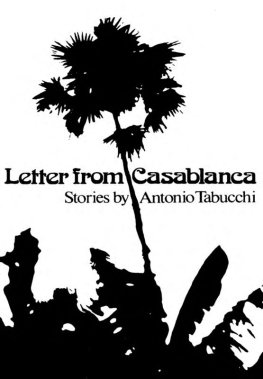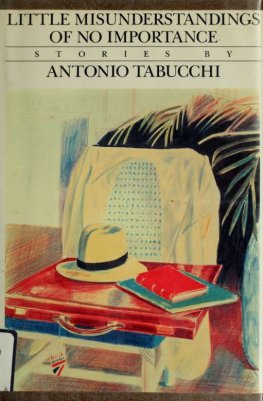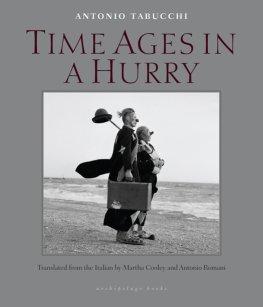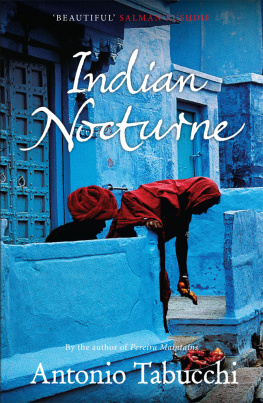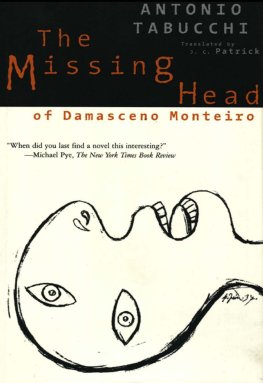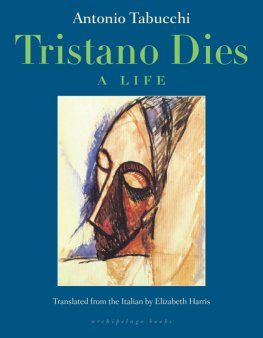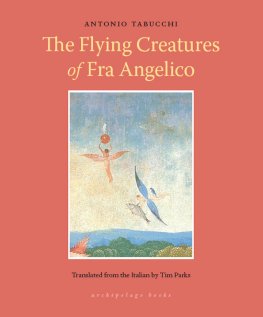
Antonio Tabucchi
The Woman
of Porto Pim
Translated from the Italian
by Tim Parks
archipelago books
Copyright Antonio Tabucchi, 2013 English language translation Tim Parks, 1991
First Archipelago Books Edition, 2013
All rights reserved. No part of this book may be reproduced or transmitted in any form without the prior written permission of the publisher.
First published as Donna di Porto Pim by Sellerio editore in 1983.
Archipelago Books
232 3rd Street #A111
Brooklyn, NY 11215
www.archipelagobooks.org
Library of Congress Cataloging-in-Publication Data
Tabucchi, Antonio, 19432012.
[Donna di Porto Pim. English]
The woman of Porto Pim / Antonio Tabucchi ; translated from the Italian
by Tim Parks. 1st Archipelago Books ed.
p. cm.
eISBN 978-1-935744-75-7
1. Whales Fiction. 2. Whaling Fiction.
3. Short stories, Italian Translations into English. I. Parks, Tim. II. Title.
PQ4880.A24D6613 2012
853'.914dc22 2012025599
Cover art: Henri Michaux
The publication of The Woman of Porto Pim was made possible with support from Lannan Foundation, the National Endowment for the Arts, and the New York State Council on the Arts, a state agency.

Contents
I am very fond of honest travel books and have always read plenty of them. They have the virtue of bringing an elsewhere, at once theoretical and plausible, to our inescapable, unyielding here. Yet an elementary sense of loyalty obliges me to put any reader who imagines that this little book contains a travel diary on his or her guard. The travel diary requires either a flair for on-the-spot writing or a memory untainted by the imagination that memory itself generates qualities which, out of a paradoxical sense of realism, I have given up any hope of acquiring. Having reached an age at which it seems more dignified to cultivate illusions than foolish aspirations, I have resigned myself to the destiny of writing after my own fashion.
Having said this, it would nevertheless be dishonest to pass these pages off as pure fiction: the friendly, I might almost say pocket-size muse that dictated them could not even remotely be compared with the majestic muse of Raymond Roussel, who managed to write his Impressions dAfrique without ever stepping off his yacht. I did step off and put my feet on the ground, so that as well as being the product of my readiness to tell untruths, this little book partly has its origins in the time I spent in the Azores. Basically, its subject matter is the whale, an animal which more than any other would seem to be a metaphor; and shipwrecks, which insofar as they are understood as failures and inconclusive adventures, would likewise appear to be metaphorical. My respect for the imaginations which conjured up Jonah and Captain Ahab has luckily saved me from any attempt to sneak myself, via literature, in amongst the ghosts and myths that inhabit our imaginations. If I talk about whales and shipwrecks, it is merely because in the Azores such phenomena can boast an unequivocal reality. There are however two stories in this small volume which it would not be entirely inappropriate to define as fiction. The first, in its basic outline, is the life of Antero de Quental, that great and unhappy poet who measured the depths of the universe and the human spirit within the brief compass of the sonnet. I owe to Octavio Pazs suggestion that poets have no biography and that their work is their biography, the idea of writing this story as if its subject were a fictional character. And then lives lost by the wayside, like Anteros, perhaps hold up better than others to being told along the lines of the hypothetical. The story which closes the book, on the other hand, I owe to the confidences of a man whom I may be supposed to have met in a tavern in Porto Pim. I wont rule out my having altered it with the kind of additions and motives typical of one who believes that he can draw out the sense of a life just by telling its story. Perhaps it will be considered an extenuating circumstance if I confess that alcoholic beverages were consumed in abundance in this tavern and that I felt it would have been impolite of me not to participate in the locally recognised custom.
The fragment of a story entitled Small Blue Whales Strolling about the Azores can be thought of as guided fiction, in the sense that it was prompted by a snatch of conversation overheard by chance. I dont even know myself what had happened before and what afterwards. I presume it is about a kind of shipwreck, which is why I put it in the chapter where it is.
The piece entitled A Dream in Letter Form I owe partly to reading Plato and partly to the rolling motion of a slow bus from Horta to Almoxarife. It may be that in the transition from dream to text the content has suffered some distortions, but each of us has the right to treat his dreams as he thinks fit. On the other hand the pages entitled High Seas aspire to no more than a factual account, the only merit they can claim being their trustworthiness. Similarly many other pages, and I feel it would be superfluous to say which, are mere transcripts of the real or of what others have written before me. Finally, the piece entitled A Whales View of Man, in addition to my old vice of looking at things from anothers point of view, unashamedly takes its inspiration from a poem by Carlos Drummond de Andrade, who, before myself, and better than myself, chose to see mankind through the sorrowful eyes of a slow animal. And it is to Drummond that this piece is humbly dedicated, partly in memory of an afternoon in Plinio Doyles house in Ipanema when he told me about his childhood and about Halleys comet.
Vecchiano, 23 September 1982
The Woman
of Porto Pim
Having sailed for many days and many nights, I realized that the West has no end, but moves along with us, we can follow it as long as we like without ever reaching it. Such is the unknown sea beyond the Pillars, endless and always the same, and it is from that sea, like the thin backbone of an extinct colossus, that these small island crests rise up, knots of rock lost in the blue.
Seen from the sea, the first island you come to is a green expanse amidst which fruit gleams like gems, though sometimes what you may be seeing are strange birds with purple plumage. The coastline is impervious, black rock-faces inhabited by marauding sea birds which wail as twilight falls, flapping restlessly with an air of sinister torment. Rains are heavy and the sun pitiless: and because of this climate together with the islands rich black soil, the trees are extremely tall, the woods luxuriant and flowers abound, great blue and pink flowers, fleshy as fruit, such as I have never seen anywhere else. The other islands are rockier, though always rich in flowers and fruit, and the inhabitants get much of their food from the woods, and then the rest from the sea, since the water is warm and teeming with fish.
The men have light complexions and astonished eyes, as if the wonder at a sight once seen but now forgotten still played across their faces. They are silent and solitary but not sad and they will frequently laugh over nothing, like children. The women are handsome and proud, with prominent cheekbones and high foreheads. They walk with waterjugs on their heads, and descending the steep flights of steps that lead to the water their bodies dont sway at all, so that they look like statues on which some god has bestowed the gift of movement. These people have no king, they know nothing of class or caste. There are no warriors because they have no need to wage war, having no neighbors. They do have priests, though of a special kind which I will tell you about later on. And anybody can become one, even the humblest peasant or beggar. Their Pantheon is not made up of gods like ours who preside over the sky, the earth, the sea, the underworld, the woods, the harvest, war and peace and the affairs of mankind. Instead they are gods of the spirit, of sentiments and passions. The principal deities are nine in number, like the islands in the archipelago, and each has his temple on a different island.
Next page

